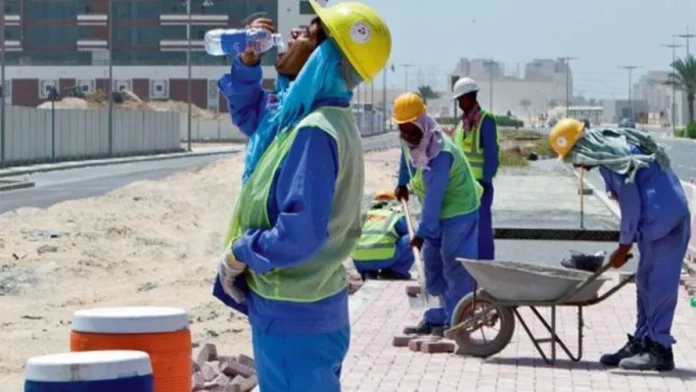Oman enforces midday work ban starting June 1 to protect outdoor labourers from soaring summer temperatures. The Ministry of Labour introduced the annual regulation, which prevents open-air work between 12:30 pm and 3:30 pm. The restriction will remain in place until the end of August.
Currently, temperatures in many regions now exceed 45°C, prompting authorities to intensify safety measures. Consequently, officials from the Ministry of Labour stated that companies must follow the rule or face serious financial penalties. Fines range from OMR 500 to OMR 1,000 for each violation.
“This decision protects workers from dangerous heat exposure during peak hours,” a ministry representative said. “We expect full compliance from all private sector firms.” Indeed, Oman enforces midday work ban as part of broader efforts to strengthen worker rights and public health protections.
Meanwhile, several construction companies have already shifted work schedules to meet the new requirements. Accordingly, contractors say early planning helps avoid both legal trouble and productivity losses. For this reason, some firms now begin operations before dawn and end work by noon.
For example, one site manager explained that his team starts at 5:00 am and finishes by 12:00 pm. This approach allows workers to avoid the harshest heat and return safely to their accommodations. Alternatively, others have moved work to the evening, allowing crews to resume after sunset.
Similarly, Sirajul Hoque, a contracting firm manager in Muscat, said his company adjusted shifts to protect staff. “We rest during the hottest hours and continue work in cooler conditions,” he said. “It’s better for safety and morale.”
Importantly, Oman enforces midday work ban not in isolation but alongside regional labour welfare strategies. Notably, countries across the GCC adopt similar heat-related rules during summer. For instance, the UAE and Qatar also impose midday breaks, encouraging companies to rotate shifts or adjust project timelines.
In these countries, compliance often involves redesigning workflows and strengthening internal oversight. As a result, GCC governments believe that improving labour conditions directly supports long-term national development goals. Accordingly, Oman follows that example by increasing inspections and promoting safer practices.
Furthermore, the Ministry of Labour and Ministry of Manpower have jointly urged employers to monitor heat risks carefully. Authorities will conduct field visits and investigate complaints related to heat exposure. Therefore, officials expect private firms to manage time efficiently while prioritising safety.
Currently, Oman enforces midday work ban during one of the hottest weeks of the year so far. Specifically, temperatures reached nearly 48°C in certain inland areas, making outdoor labour extremely hazardous. For many workers, the midday pause offers a vital break.
“This week has been brutal,” said Jasvwinder Singh, a 45-year-old labourer working in Seeb. “We need time to rest, drink water, and stay out of the sun.” As expected, he welcomed the regulation, saying the break helps workers recover and stay focused.
Overall, labour rights advocates say the midday break demonstrates progress in Oman’s employment policies. Additionally, it brings national practices in line with international labour norms. Observers argue that such policies reduce heat-related illnesses and strengthen workforce resilience.
As temperatures continue to rise, enforcement will become more critical. Nevertheless, officials remain committed to holding violators accountable through fines and public reporting. Authorities believe strict implementation will protect workers and reinforce responsible corporate behaviour.
In conclusion, Oman enforces midday work ban with clear goals: to prevent heatstroke, reduce health emergencies, and foster ethical labour practices. The government encourages all businesses to plan ahead and ensure safe conditions for every worker this summer.


